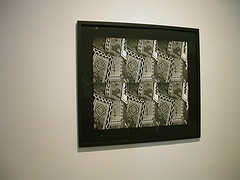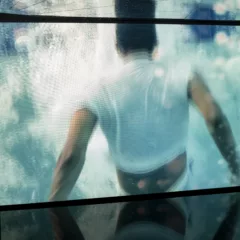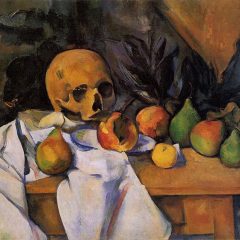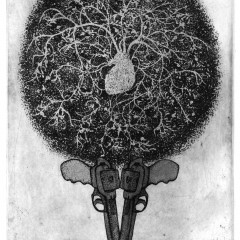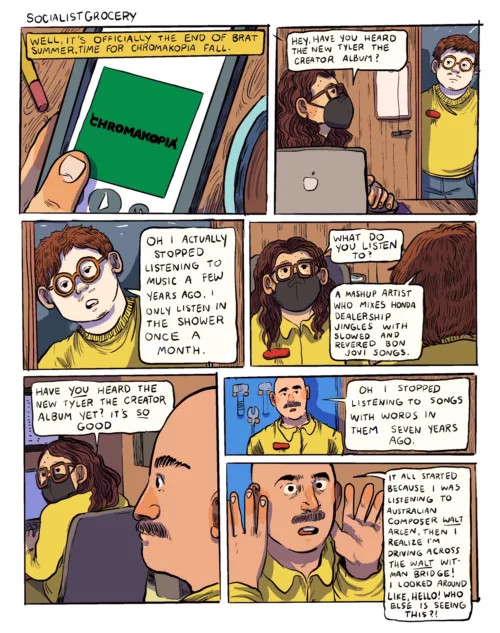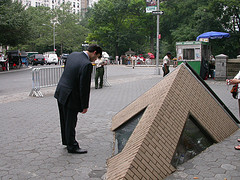
Sarah Sze, adult peering into interior
As Libby said it’s summer and it’s hot–always a good time to go to museums. We knew that but we went to Chelsea instead. So we sweated our way through the streets, but saw some fair stuff. Our cheeriest siting all day was when we ran into Paul Santoleri and his wife Helene strolling in front of the Empire Diner (we had just exited after having iced tea (Libby) and lemonade (me). It was so great to see the homies!!!
Helene, a cellist who plays in a band (sorry I forgot the name) had a gig in Brooklyn and Paul was along for the event. Meanwhile, they were art-looking and had seen some gorgeous sculptural clay works and were looking for more beauty. We couldn’t really help them unfortunately but told them to go look at Sarah Sze‘s piece in Central park. Paul is a public artist so he was very interested in this. I could see a Santoleri piece in New York…what a great idea.
Anyway, I’ll try to be one liner-ish here (ha! as if it were possible) and just put in a lot of pix. Most of what we saw is closed now (except Sarah Sze, Richard Serra and the drawing show Astrid Bowlby’s in.)
Nothing really knocked my socks off. But then that’s typical of an art outing in the summer, a low energy season in New York–except for the Public Art Fund and Creative time which usually do great projects in the summer.
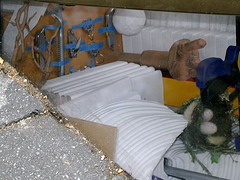
Sarah Sze, detail showing tool wall and top of cardboard microscope
I liked the way Sarah Sze managed to make her un-weather-worthy stuff be outside in a public space. That is a triumph. As for the piece, you need to stoop down to see the Lilliputian environment encased in the faux building seemingly sunk in the ground. That makes it difficult for adults–but great for kids. And I saw some jumping over the corner of it and really looking at what was inside. My favorite in her materials-rich piece was the “tool wall” with nail clippers, dog tags, a razor, a box cutter, matches. Elsewhere, she had made what looked like a microscope out of cardboard.
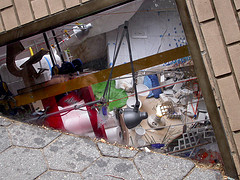
Sarah Sze, detail showing cardboard microscope
There were cartons of Morton’s salt lined up, stacks of hand soap, stacks of white hotel towels, stacks of toilet paper, some green (faux) lily pads with drops of water on them; books covered in white paper, a tiny birds nest with two speckled eggs. The vibe I picked up from the utilitarian tools and the excessive numbers of things stockpiled and the anonymity of the whole thing was a terrorist’s hideaway peeking up above ground and looking all innocent but really. It’s the tip of the iceberg. Note: this is my interpretation. It is not — probably — what the artist intended.
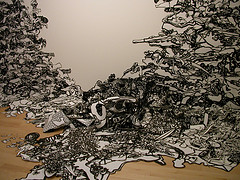
Astrid Bowlby at BravinLee Projects.
The BravinLee Projects show with Astrid Bowlby looks great. Astrid’s piece looks great. It crawls up two walls in a little alcove and is the black lace on paper invasion we know and love. She keeps getting better, Ms. Bowlby.
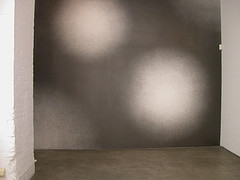
Sol Lewitt wall drawing at Cooper.
Color-theme shows were in evidence: First, the red show, An Ongoing Low-Grade Mystery at Paula Cooper and then the Black and Blue at Robert Miller Gallery.
Tucked away in one of the Cooper spaces — all filled with wonderful red objects that seemed to ping and karom off each other in interesting ways — was a brand new Sol Lewitt wall drawing done specially for the Cooper space. Very cosmic (made of tiny spidery graphite lines when you got up close). I felt like I’d discovered a diamond.
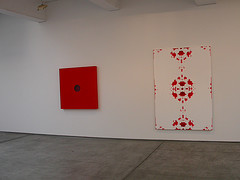
Donald Judd, left (can you believe it?). Right is Heaven/Hell by Lisa Beck. Circles and squares predominated in the red show.
In the red realm, the other discovery was the Donald Judd piece “Untitled” 1962-1990, a flat red painting with an inset circle of red glass!!!! How un-Donald was that and how truly wonderful. The show elsewhere was full of canvases with holes cut out of them or things hanging off them.
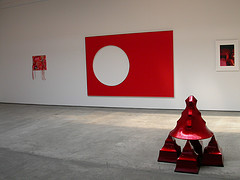
Sculpture by Vincent Szarek, cutout painting by Steven Parrino. Right (click through to all sizes to see it big enough) is the Eggleston nude photo Libby mentioned. And way left is Jutta Koether.
Even though the art, like Wolfgang Tillmans‘ photo of a red cloth, was pretty cool, like Libby said, it was tres hot in the second-floor un-airconditioned space. I would have liked a bench to sit on and maybe a fountain to put my feet in. Red water in the fountain? Red kool-aid to drink?
The Black and Blue which is up at Miller through July has a nice surprising Warhol from 1976-86. (what’s with these dates?) “Small overlapping prayer rugs” was stitched together gelatin silver prints. It felt a little like a foundation 2-D design course project and I kind of loved it, drooping threads and all.
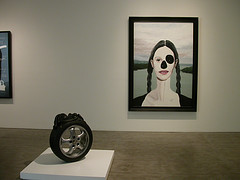
Patricia Piccinini, left, Richard Butler, right
As with the red show, the pairings and groupings of work were terrific…My favorite grouping was Patricia Piccinini‘s “Radial,” a round black-hole of a tire and Richard Butler‘s Benzene Poster Girl in Weisbaden,” an oil painting whose black-hole eye and nose echoes and talks nicely with Piccinini’s tire about gas and waste and toxicity and apocalypse.
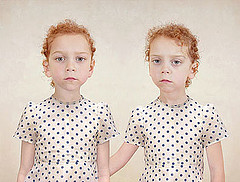
Loretta Lux’s digital photo from Yossi Milo, over now.
Loretta Lux at Yossi Milo Gallery and Sharon Lockhart at Gladstone Gallery were both interesting but not that interesting. Lux’s “painted” photos remind me of John Currin‘s paintings–they’re grotesqueries….Balthus and even Norman Rockwell in a couple of them also come to mind.
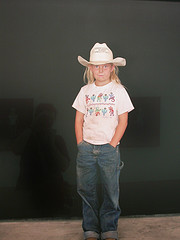
Sharon Lockhart’s portraits of children
Lockhart’s photos of kids remind me of Mary Ellen Mark‘s photos of street kids. In both cases, Currin and Mark have made stronger, meatier works than what’s in eith of the shows we saw by Lux and Lockhart.
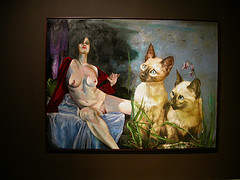
Martin Eder. If it wasn’t so literally kitty porn it might be funny. As is it’s silly.
At Marianne Boesky Gallery, formerly home to Lisa Yuskavage, I found the Martin Eder kitty porn paintings ridiculous. Big, puffy and silly. Porn happens and kitty porn happens. So? I wanted the paintings to go somewhere and yet they didn’t. The whole thing was a little timid for all its grandiosity.
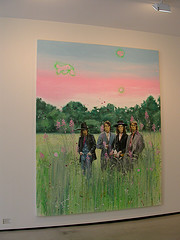
Till Gerhard’s splotches on top of a nicely painted painting. what’s up?
Also in the ridiculous category are Till Gerhard‘s Black Nostalgia paintings at Stellan Holm Gallery. This is a German artist who’s capable of painting large narrative landscape paintings. Here the works seem to be replaying album covers from the 1960s (Dylan, Beatles, summer of love stuff). But the artist splatters the paintings up with drips and dots and smears of paint that sit on the surface like fashion accessories. We’ve all done that. It’s what you do when you’re not sure of your underlying subject matter and you want to distract the viewer from thinking you’re really about what’s pictured. Just smear it a little with some drips and then the work becomes vaguely conceptual…. But the result usually feels sophomoric and it does here. My advice, either paint it or don’t.
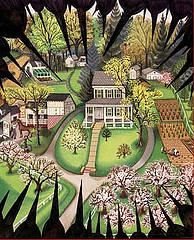
One of the images from Bird Flu Dreams
Our first stop, and our quickest because the storefront gallery had no air conditioning at all, was Bird Flu Dreams at Magnan Emrich Gallery. It looked like a good little show of small paranoid and paranoia-inducing works with birdies. But I couldn’t focus enough in all that heat to pass judgment.
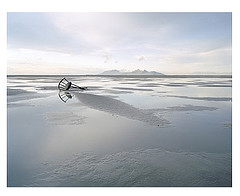
One of Jimmy and Dena Katz’s Salt Dreams
Salt Dreams at Peer Gallery on the other hand was a show with cool cleansing imagery, and the gallery’s air conditioned space was great to hang out in while looking. Photos by Jimmy and Dena Katz of the Utah Salt Flats and the Great Salt Lake were easy on the eyes. Blizzard, Antarctica and cool climates are suggested by the bleached white salt flats and the white mountains in the distance. Richard Misrach also walked the salt flats and shot some magnificent scenes of the racing subcultures that hang out here. Steve and I saw some of those photos when we were gallery-going in April. But, while not completely unique, the Katz photos are delicious and well done. There’s a book, too.
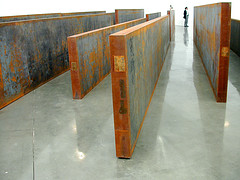
Richard Serra’s chutes without ladders at Gagosian
Finally, I’m going to end with Richard Serra, perhaps the big disappointment of the day. We’d previously walked Serra’s canyons of steel at Gagosian. These new smaller, chunkier works, up to August 11, were more like game pieces — chutes with no ladders, channels in pinball games, with the bodies moving up and down the channels looking like little ball bearings. They were oppressive instead of exhilarating and they seemed half-hearted. Neither the materials’ surfaces which are the expected and quite wonderful rusty pitty steel nor the subject matter — whatever it is –held my interest.


